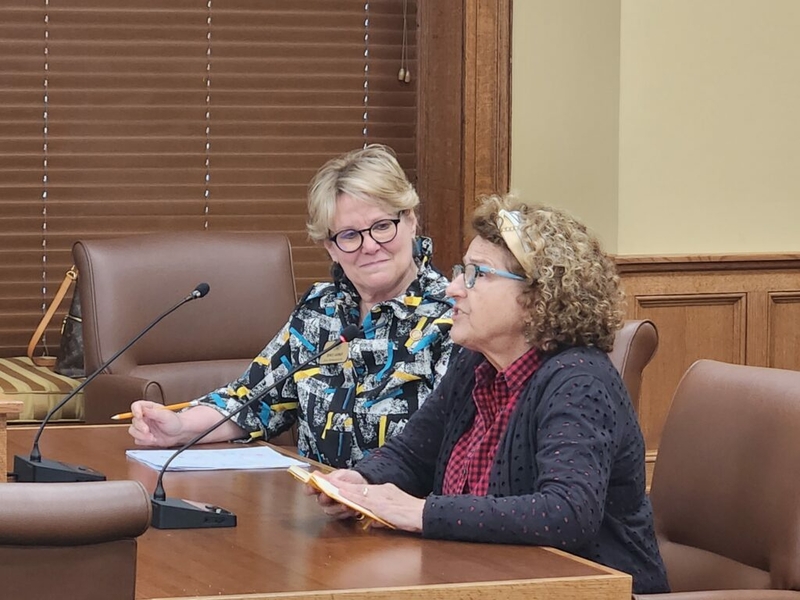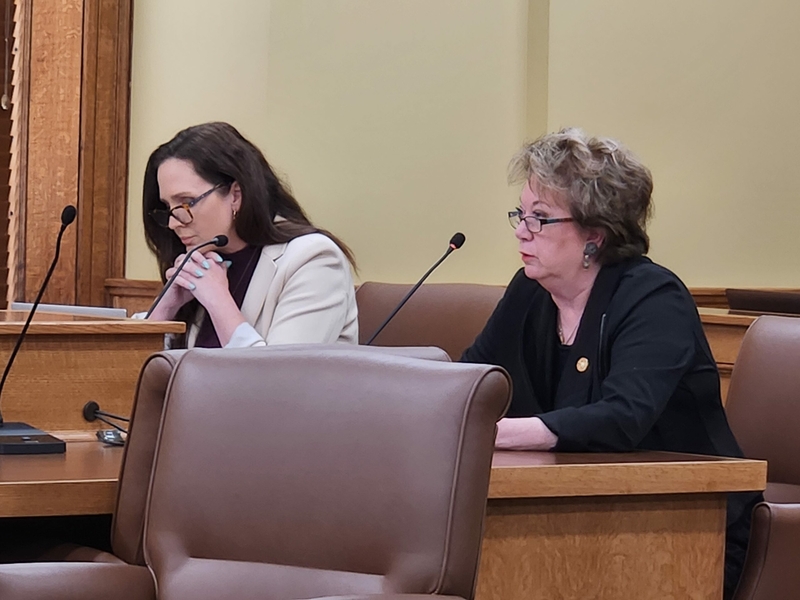Lawmakers reject two proposed exceptions to Arkansas’ abortion ban

The Arkansas House Judiciary Committee rejected two proposed exceptions to the state’s near-total abortion ban Thursday.
House Bill 1670, sponsored by Rep. Ashley Hudson, D-Little Rock, would have added an exception in cases of incest, while House Bill 1684, sponsored by Rep. Denise Garner, D-Fayetteville, would have added the health of the mother as an additional exception to Act 180 of 2019, broadening the definition of a “medical emergency.”
Both bills failed on split voice votes.
Act 180 is one of the nation’s strictest abortion bans, with the sole exception “to save the life of a pregnant woman in a medical emergency.” The law went into effect in June 2022, the same day the U.S. Supreme Court overturned Roe v. Wade and left abortion access up to individual states.
Oklahoma’s Supreme Court ruled on March 21, the day before Garner filed House Bill 1684, that exceptions for the health of the mother were allowed under the state’s near-total abortion ban.
However, the conservative Family Council said March 22 that the bill would “effectively legalize elective abortion” in Arkansas.
Rep. Cindy Crawford, R-Fort Smith, made a similar comment during the committee meeting.
“If we start abortion again in Arkansas, it will not end,” she said.
However, waiting until a patient’s life is in danger before administering treatment violates medical professionals’ standard of care, which is usually considered medical malpractice, Garner told the committee in response to questions from Hudson.
Garner added that some physicians are leaving or choosing not to live in Arkansas because of the risk of either breaking the law for properly treating a patient or following the law at patients’ expense.
“We’ve got to think beyond the imminent danger of health and allow our medical professionals to take care of their patients,” said Garner, a retired oncology nurse.
Ali Taylor and Karen Musick, representatives of the Arkansas Abortion Support Network, spoke for the bill, and no one spoke against it.
Musick used to escort pregnant Arkansans to and from abortion clinics before Roe v. Wade was overturned. She shared stories of women who received abortions because they had cancer, multiple sclerosis or other health problems that meant carrying a pregnancy to term would have killed them.
“Women spend most of our lives trying to not get pregnant or trying to get pregnant,” Musick said. “It’s an overwhelming responsibility that becomes even more critical when your choices are to live or to die. If those are taken away from you, where’s our compassion?”
Taylor asked the same question, adding that most people who receive abortions already have children.
“I’m asking you to extend the compassion you feel for the unborn to the children that are already here,” Taylor said.
Rep. Marcus Richmond, R-Harvey, said he was “sympathetic” to the issue but voted against the bill because he thought its language should have been “tighter.”
“It’s going to be such an arbitrary thing that anybody who’s wanting to perform an abortion will be able to make some claim somehow that their health is being affected, and they can find somebody who will support that,” Richmond said.
Protecting children
Hudson said House Bill 1670 would have created a “small exception” applicable under “very limited circumstances” and primarily aimed at children under 16, the age of sexual consent in Arkansas.
Act 180 gives pregnant minors who are victims of sexual violence no other option but to give birth, Hudson told her fellow committee members. Children might not be physically capable of giving birth and could either die or have lifelong physical disabilities as a result, and they might not qualify for the exception in the law, she said.
“That mother has to be very much on the brink of death in order to qualify, and in many cases, the harm to the child is not readily apparent [and] would not happen immediately,” Hudson said.
She added that the state has the nation’s highest percentage of pregnancies in children under 15 years old and that 2.4% of all minors who become pregnant in the United States are from Arkansas.
Hudson reminded the committee that lawmakers have said repeatedly this legislative session that protecting children should be a high priority.

Toni Rose, director of the Arkansas Legislative Prayer Caucus and co-founder of the faith-based nonprofit An American Speaks, was the sole witness against the bill and called it “violence answered with violence.”
She said incestuous sexual predators would be able to “eliminate the evidence” of their acts of violence if they can repeatedly take their victims to receive abortions under the proposed law.
No one testified in favor of the bill.
Other abortion legislation
Several bills pertaining to abortion were filed during or after last week’s Spring Break, including one from Rep. Aaron Pilkington, R-Knoxville. House Bill 1786 would specify that abortions to save the life of the mother would only be legal if they are performed in a hospital or emergency room.
Additionally, Senate Bill 466 would ban public and charter schools from providing or offering referrals for abortions. The Senate passed the bill along party lines Thursday with 27 Republicans voting for it, all six Democrats voting against it, and the remaining two Republicans not voting.
Senate Minority Whip Linda Chesterfield, D-Little Rock, said on the Senate floor that the bill is “not necessary government” and would ban something that simply “is not happening.”
Two bills were filed last week pertaining to abortion medication as a federal judge in Texas is set to decide whether to ban the abortion drug mifepristone.
House Bill 1686 from Rep. Wayne Long, R-Bradford, would “prohibit chemical abortions” and create the Arkansas Chemical Abortions Ban Act, according to the one-sentence shell bill. He declined to comment about whether another bill is forthcoming.
Sen. Ben Gilmore, R-Crossett, is sponsoring a bill that would revoke physicians’ medical licenses if they are found to violate state law pertaining to the administration of abortion-inducing medication. Senate Bill 463 passed the Senate with a party-line vote Tuesday.
The sole abortion-related bill in Arkansas that has become law so far this year is Act 310, which will create a “monument to the unborn” on state Capitol grounds.
Earlier this month, the House Public Health, Welfare and Labor Committee rejected a proposed exception to the state’s abortion ban for cases of fetal abnormalities “incompatible with life.”
House Bill 1301, sponsored by Rep. Nicole Clowney, D-Fayetteville, would have allowed physicians to induce labor in rare cases when a fetus has a condition that prevents living beyond a few hours after delivery, if at all. Representatives from the Family Council spoke against House Bill 1301 before the committee’s vote.
Two more abortion-related bills have not been heard in committee since being introduced early in the session. House Bill 1174 would charge abortion recipients and their doctors with homicide, and Senate Bill 261 would create tax credits for fetuses.








